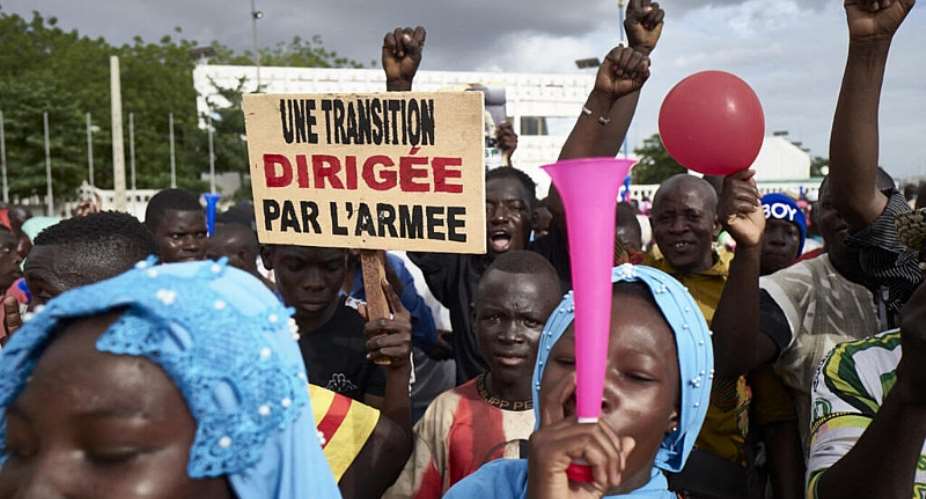Campaigning for Mali's referendum on long-delayed changes to its constitution kicked off on Friday, ahead of the vote on 18 June. The country's military rulers say the new constitution has been drafted with the input of ordinary citizens, but some observers fear it will concentrate power in the hands of the president.
The junta, which overthrew Mali's last elected president in August 2020, announced the vote in early May.
A constitutional referendum has been on the cards for several years and was initially scheduled for July 2017, before being postponed several times amid protests.
The original amendments would have created new regions in line with a 2015 peace agreement with separatists in northern Mali, as well as establishing regional councils.
They also granted extra powers to the president, who would have had the authority to appoint one-third of the members of the senate.
The text has since been revised under the ruling junta.
Bakary Traore, a member of the military government's Mission to Support the Rebuilding of the State (MARE), took part in a campaign to redraft the new constitution.
He told RFI that the text was available in most cities and villages, as well as online, for voters to familiarise themselves with it before the ballot.
"I'm optimistic," he said. "We put in place an inclusive and participatory process from November 2021, and the text was drafted by a special commission, representing all part of society."
Greater presidential powers
Even so, the latest draft has been said to significantly strengthen the power of the president.
"Most of the powers are concentrated in the hands of the president," Kassoum Tapo, a lawyer, former territorial administration minister and member of the Cadre d'échanges, a grouping of several political parties and coalitions, told the French newspaper Le Monde in March.
Having seen a copy of the text, he argued that it would allow the president to implement national policy instead of the government, to appoint and dismiss the prime minister and other ministers, and dissolve the National Assembly.
He claimed that the new constitution "stripped the government of all its powers".
Traore acknowledged that the constitution reinforces executive powers, but insisted that they were well-balanced with those of the judiciary and the future government.
2024 elections
The vote on a new constitution is intended to pave the way to elections and a return to civilian rule.
The next elections are due to be held in February 2024.
The African Union Commission welcomed the referendum as as part of "key collective efforts towards the return to constitutional order".
The International Crisis Group also hailed it as a positive development, but warned that it was "not enough to dispel doubt about the authorities' ability to organise the presidential election scheduled for February 2024".
In May, a coalition of members of the opposition and civil society organisations denounced the referendum, citing organisational problems and questioning the junta's legitimacy to call the poll.
"The current constitution regulates constitutional amendments, and the conditions are very clear: only a democratically elected president can undertake them," Cheick Mohamed Chérif Koné, a magistrate and one of the coalition's coordinators, told RFI.





 There’s nothing you can do for us; just give us electricity to save our collapsi...
There’s nothing you can do for us; just give us electricity to save our collapsi...
 Ghanaian media failing in watchdog duties — Sulemana Braimah
Ghanaian media failing in watchdog duties — Sulemana Braimah
 On any scale, Mahama can't match Bawumia — NPP Youth Organiser
On any scale, Mahama can't match Bawumia — NPP Youth Organiser
 Never tag me as an NPP pastor; I'm 'pained' the 'Akyem Mafia' are still in charg...
Never tag me as an NPP pastor; I'm 'pained' the 'Akyem Mafia' are still in charg...
 Your refusal to dedicate a project to Atta Mills means you never loved him — Kok...
Your refusal to dedicate a project to Atta Mills means you never loved him — Kok...
 2024 elections: I'm competent, not just a dreamer; vote for me — Alan
2024 elections: I'm competent, not just a dreamer; vote for me — Alan
 2024 elections: Forget NPP, NDC; I've the Holy Spirit backing me and nothing wil...
2024 elections: Forget NPP, NDC; I've the Holy Spirit backing me and nothing wil...
 2024 elections: We've no trust in judiciary; we'll ensure ballots are well secur...
2024 elections: We've no trust in judiciary; we'll ensure ballots are well secur...
 Performance tracker: Fire MCEs, DCEs who document Mahama's projects; they're not...
Performance tracker: Fire MCEs, DCEs who document Mahama's projects; they're not...
 Train crash: Railway ministry shares footage of incident
Train crash: Railway ministry shares footage of incident
